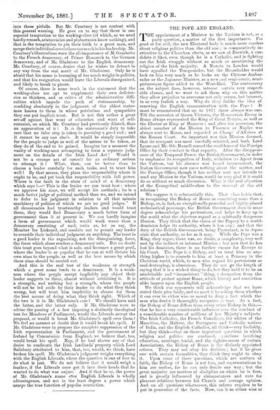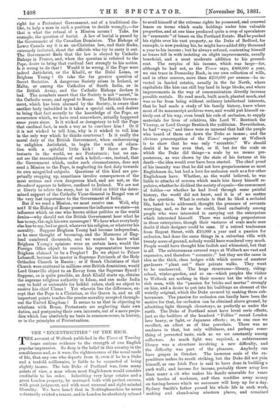THE POPE AND ENGLAND.
THE appointment of a Minister to the Vatican is not, as a party question, a matter of the first importance. For good or for evil, the new Electoral body is much more careless about religious politics than the old one ; is comparatively in- attentive to the Churches, elects, as we saw at Berwick, a can- didate it likes, even though he is a Catholic, and is fighting out the Irish struggle without so much as mentioning the religion of the Irish majority. A Nuncio in London would have appalled the Ten-pounder, but the Householder would look on him very much as he looks on the Chinese Ambas- sador or the Japanese Minister, as a new and semi-comic, semi- picturesque figure added to the West-End. The controversy on the subject does, however, interest certain very respect- able classes, and we want to ask them why on this matter they allow prejudice to overcome not only reason, but interest, in so very foolish a way. Why do they dislike the idea of renewing the English communication with the Pope ? It must be remembered that up to 1871 there always was one. Till the accession of Queen Victoria, the Hanoverian Envoy in Rome always represented the King of Great Britain, as well as the Elector or King of Hanover ; and after her accession, the ablest member of the Mission to Florence or Naples was always sent to Rome, and regarded as Chargt: d'Affaires at the Roman Court. So important was this Mission deemed, that its occupant was most carefully selected, and both Lord Lyons and Mr. Odo Russell earned the confidence of the Foreign Office by their conduct in that capacity. After the disappear- ance of the Temporal Power, the British Government, in order to emphasize its recognition of Italy, withdrew its Agent from the Vatican, but his absence was found inconvenient, the Italian Government now cares nothing about the matter, and the Foreign Office, though it has neither sent nor intends to send any Mission to the Vatican, would be very glad if it could do so without so much discussion. What is the real objection of the Evangelical middle-class to the renewal of the old relation ?
We suppose it is substantially this. That class holds that, in recognising the Bishop of Rome as something more than a Bishop, as, in fact, an exceptionally powerful and highly-placed ecclesiastical personage, the British Government does in some degree acknowledge his pretensions, and helps to keep up in the world what the objectors regard as a spiritually dangerous illusion. They think that the claim of the Papacy to a world- dominion helps its authority, where it has any ; and that the duty of the British Government, being Protestant, is to depre- ciate that authority, so far as it may. While the Pope was a King, they argue, there was, no doubt, a complexity, very well met by the indirect or informal Mission ; but now that he has lost his dominion, there is no further excuse for Envoys to his Court. The Pope is a Bishop, and to treat him as any- thing higher is to concede to him at least a Primacy in the Christian world, which, to men who regard his pretensions as soul-destroying, is obnoxious. They do not go the length of saying that it is a wicked thing to do, but they hold it to be an unadvisable and " inconsistent " thing, a derogation from the attitude of protest against Rome, which history and conviction alike impose upon the English people.
We think our opponents will acknowledge that we have stated their plea fairly, and we meet it by asking them whether it can ever be either wise or moral to deny a fact which the man who denies it thoroughly recognises as true. As a fact, the Bishop of Rome differs from every other Bishop in this,— that he has a very considerable influence over the conduct of a considerable number of millions of her Majesty's subjects. The Irish Catholics, the French Canadians, the whites of the Mauritius, the Maltese, the Portuguese and Catholic natives of India, and the English Catholics, all think—very foolishly, but they think—that on those important questions in which religion and politics are confused, questions involving education, marriage, burial, and the righteousness of certain Associations, the Bishop of Rome is the divinely appointed referee. They may not obey his decision ; but if he gives one with certain formalities, they think they ought to obey it. Upon some of these questions, which are matters of faith, the Bishop of Rome is not free, and representations to him are useless, for he can only decide one way ; but the great majority are matters of discipline on which he is free, and is greatly influenced by circumstances and care for pleasant relations between his Church and average opinion. And on all questions whatsoever, this referee requires to be put in possession of the facts. Now, can it be either wise or
right for a Protestant Government, out of a traditional dis- like, to help a man in such a position to decide wrongly,—for that is what the refusal of a Mission means ? Take, for example, the question of burial. A law of burial is passed by the Government of the Canadian Dominion. The Bishops of Lower Canada say it is an un-Christian law, and their flocks, extremely irritated, shoot the officials who try to carry it out. The Government finds that the law is obeyed by Catholic Bishops in France, and, when the question is referred to the Pope, desire to bring that cardinal fact strongly to his notice. Is it wrong to do that ? Would it be wrong, if the Pope were indeed Antichrist, or the Khalif, or the Dalai Lama, or Brigham Young ? Or take the far greater question of Secret Societies. A dangerous Society arises in Ireland, or Malta, or among the Catholics of South India, or in the British Army, and the Catholic Bishops declare it bad. The members assert that the Society is not " secret," in the Catholic sense, and appeal to Rome. The British Govern- ment, which has been alarmed by the Society, is aware that another body imbedded in it takes a special oath, and desires to bring that fact secretly to the knowledge of the Pope, an occurrence which, we have read somewhere, actually happened some years since. Is it wicked or derogatory to tell the Pope that cardinal fact, in such a way as to convince him ? Or if it is not wicked to tell him, why is it wicked to tell him in the only way which be thinks courteous ? Is it really the moral duty of the British Government, when endeavouring to enlighten Antichrist, to begin the work of educa- tion with a spiteful little kick ? If there are Pro- testants in the world, we are Protestants ; but we can- not see the reasonableness of such a belief,—see, instead, that the Government which, under such circumstances, does not send a Mission to the Pope, is neglecting its first duty towards its own misguided subjects. Questions of this kind are per- petually cropping up, sometimes involve consequences of the most serious and even dangerous kind, and are not, as the Standard appears to believe, confined to Ireland. We are not at liberty to relate the story, but in 1858 or 1859 the deter- mined support of the Catholic Vicar-General in Bengal was of the very last importance to the Government of India.
Bat if we send a Mission, we must receive one. Well, why not? If the Bishop of Rome possesses the influence we state—an influence which no one who knows either politics or the world denies—why should not the British Government hear what he has to say, through his own messenger? We hear what everybody else has to say, bad or good, whatever his religion, or whatever his morality. Suppose Brigham Young had become independent, as he once thought of becoming, and the Mormons of Eng- land numbered thousands, and we wanted to know what Brigham Young's opinions were on certain laws, would the Foreign Office object to receive his representative because Brigham claimed to be a Prophet? Do we object to Prince Lobanoff, because his master is Supreme Patriarch of the Holy Orthodox Church in Russia ; or if Greek Christians of that Church were scattered in millions over British dominions, would Lord Granville object to an Envoy from the Supreme Synod ? Suppose, as is quite possible, an Arab Khalif starts up, obtains the supreme religious authority in Islam, and can make India easy to hold or untenable for Infidel rulers, shall we object to receive his chief Ulema ? Yet wherein lies the difference, ex- cept that the Pope is a Christian, as the Queen is, and on all important points teaches the precise morality accepted through- out the United Kingdom ? It seems to us that in objecting to relations with Rome, Protestants are neglecting their own duties, and postponing their own interests, out of a mere preju- dice which has absolutely no basis in common-sense, in history, or in the principles of Protestantism.



































 Previous page
Previous page